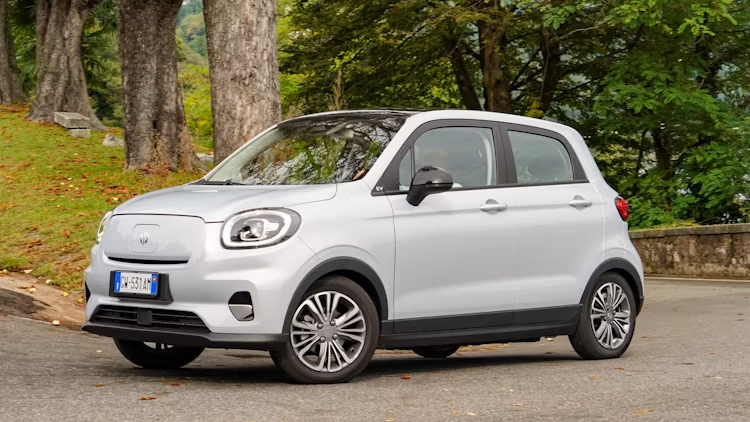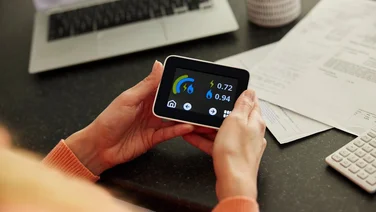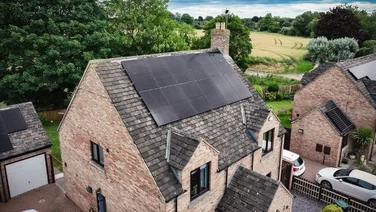- A gas boiler is the cheapest way to heat your home
- But electric combi boilers will take top spot in the next decade
- Ground source heat pumps are the most expensive heating system
Energy prices continue to climb, with Ofgem announcing bills will rise by 1.2% from January 2025. As a result, there’s never been a better time to cut your heating costs.
In this guide, we’ve analysed eight key areas where heating is used, and ranked them in order of how much they’ll cost you over the next 10 years.
We’ve explained the cost benefits of each system to help you make the best choice for your home. Check out our methodology for more detail.
One area will include installing low-carbon technologies, like a heat pump, that can significantly reduce your bills. The first step to installing a heat pump is getting quotes. If you fill in our form, we’ll be in touch with some from our trusted suppliers.

Methodology
Our team of four researchers have spent approximately 30 hours researching the costs incurred by the following 10 methods:
- Gas boiler
- Gas boiler and solar thermal panels
- Oil boiler
- Electric combi boiler
- Air source heat pump
- Biomass boiler
- Infrared heating panels
- Wood burner
- Space heaters
- Ground source heat pump
We found the average purchase and installation cost of each system, including a hot water cylinder, if necessary, and then worked out each of their annual running costs, factoring in the current prices of electricity, gas, and oil.
We decided to provide the cost of each system after 10 years because whichever system you choose, it’s a significant investment – and you should know that it’s going to be worth it.
What’s the cheapest way to heat your home?
The cheapest way to heat your home is a gas boiler, which will cost the typical three-bedroom house £12,553 to run over 10 years.
Gas is generally cheaper than electricity – and modern gas boilers are more energy-efficient than their older counterparts, as reported by Check A Trade. As of January 2025, gas per kWh will be 6.34p, compared to electricity, which will be priced at 24.86p per kWh.
However, gas and electricity prices continue to rise, so it can be worth installing some solar thermal panels on your roof, in addition to your gas boiler to help cut your heating bill in half.
Electric combi boilers, air source heat pumps and infrared panels will become more cost-effective over the next decade, so by the time the proposed new gas boiler installations will be banned by 2035, one of these systems will be your best option.
It’s worth noting that the Labour government is considering reversing this ban, instead focusing on financial incentives to increase heat pump installations.
In contrast, the price of installing ground source heat pumps will have to plummet to make them worth it, while biomass boilers and oil boilers are on the edge of obsolescence.
| Position | Heating system | Cost after 10 years* |
|---|---|---|
| 1 | Gas boiler | £12,533 |
| 2 | Gas boiler and solar thermal panels | £14,067 |
| 3 | Oil boiler | £19,870 |
| 4 | Electric combi boiler | £20,522 |
| 5 | Air source heat pump | £20,971 |
| 6 | Biomass boiler | £27,280 |
| 7 | Infrared heating panels | £32,150 |
| 8 | Wood burner | £32,345 |
| 9 | Space heaters | £36,730 |
| 10 | Ground source heat pump | £47,471 |
* Based on the average three-bedroom house
1. Gas boiler
| Initial cost for a 3-bedroom house | Annual running cost | Cost after 10 years |
|---|---|---|
| £4,000 | £853 | £12,553 |
A gas boiler is still the cheapest way to heat your home when comparing various heating systems, especially when analysis the latest figures from Ofgem.
As of December 2024, the cost of gas is 6.24p per kWh, a 10% increase on the previous quarter, and still higher year-on-year.
But the cost of gas will inevitably rise as the UK moves away from fossil fuels and towards renewable energy.
What’s more, if the gas boiler ban goes ahead in 2035, gas boilers will soon lose their spot in our rankings.
From an energy efficiency perspective, it’s worth looking at the renewable contenders we’ve analysed lower down.
2. Gas boiler and solar thermal panels
| Initial cost for a 3-bedroom house | Annual running cost | Cost after 10 years |
|---|---|---|
| £9,800 | £427 | £14,067 |
With gas and electricity prices hitting new highs all the time, the future is renewable.
Solar thermal panels cost a relatively affordable £4,000 on their own, but like most heating systems, they also require a hot water cylinder, which typically costs £1,800.
And unlike most heating systems, they also need a gas boiler, increasing the initial cost by another £4,000.
This is because, like solar panels, thermal panels won’t absorb enough sunlight during the colder months to meet all your water heating needs.
However, across the year, they’ll provide around 50% of your heating for free – and if you already have a gas boiler, this is a gloriously cheap way to heat your home.
If you need a new gas boiler, just use our free tool. Fill in a few quick details, and our trusted installers will be in touch with free quotes.

3. Oil boiler
| Initial cost for a 3-bedroom house | Annual running cost | Cost after 10 years |
|---|---|---|
| £6,500 | £1,337 | £19,870 |
You’ll usually need to pay £4,700 for an oil boiler and £1,800 for a hot water cylinder. It’s possible to get an oil combi boiler, but they’re less common, and worse at serving a typical three-bedroom house.
However, despite its relatively affordable status at the moment, we don’t recommend getting an oil boiler.
Oil has become 25% more expensive over the past two years, according to the Office for National Statistics.
We haven’t included price projections for different fuels in this article, as the energy market is difficult to definitively predict – but the price of oil is extremely likely to continue rising rapidly, as the UK moves away from fossil fuels.
Getting an oil boiler is therefore likely to become the most expensive way to heat your home in the next few years as the UK continues its transition towards renewable energy.
4. Electric combi boiler
| Initial cost for a 3-bedroom house | Annual running cost | Cost after 10 years |
|---|---|---|
| £3,350 | £1,717 | £20,522 |
As households move away from gas and oil boilers – both because of government intervention and to avoid expensive bills – electric combi boilers will become increasingly popular.
Just like gas combi boilers, they can supply hot water and heat instantaneously, so you won’t notice a difference in your routine.
You can also save tonnes of CO2 by going electric.
197,000 homes in the UK already have electric boilers – and we expect this figure to rise rapidly in the coming years.
5. Air source heat pump
| Initial cost for a 3-bedroom house | Annual running cost | Cost after 10 years |
|---|---|---|
| £10,000 | £1,097 | £20,971 |
Heat pumps are at least three times more efficient than any other kind of boiler, meaning they require only one third of the fuel that other systems use.
However, the high initial cost and the fact that electricity is still four times more expensive than gas makes it less attractive than other systems – for now.
Fortunately, the Boiler Upgrade Scheme (BUS)can solve one of those problems by reducing the initial cost by £7,500. Use this grant, and an air source heat pump becomes a much cheaper way to heat your home.
As the UK government continues to invest further into low-carbon technologies and plans to remove green levies from electricity bills, air source heat pump costs will soon look more appealing than gas boiler payments.
If you’d like to see how much you could get a heat pump for, just fill in this short form, and we’ll put you in touch with local installers who’ll give you free quotes.
6. Biomass boiler
| Initial cost for a 3-bedroom house | Annual running cost | Cost after 10 years |
|---|---|---|
| £17,800 | £948 | £27,280 |
Biomass boilers are too expensive, unless you’re willing to find and chop up between two and three tonnes of wood yourself every year.
Even then, a biomass boiler would cost more over a decade than solar thermal panels or a gas boiler.
You can reduce the initial cost of purchase and installation by using the BUS to get £7,500 off, but you’re better off using the scheme to get an air source heat pump.
Biomass machines aren’t even climate-friendly. They emit 0.7 tonnes of greenhouse gases per year on average, while also reducing the number of CO2-capturing trees in the world.
7. Infrared heating panels
| Initial cost for a 3-bedroom house | Annual running cost | Cost after 10 years |
|---|---|---|
| £7,800 | £2,435 | £32,150 |
Based on your ceiling or walls, these electricity-powered panels use harmless radiation to efficiently heat objects, instead of the air around them.
Infrared panels’ running costs would be the lowest on this list, if you didn’t also have to buy a direct hot water cylinder.
Infrared panels don’t heat your water, meaning you’ll need to pay to run this electric water tank, which costs an extra £1,923 per year.
Only 33,000 UK homes are currently heated by infrared panels – a figure which will likely increase as people move away from gas, but which will only truly take off when the cost of infrared panels and electricity falls.
If you’d like to get infrared panels for your home, you can find the perfect set of panels by using our easy-to-navigate tool. Just provide a few details, and our expert installers will be in touch with free quotes.
8. Wood burner
| Initial cost for a 3-bedroom house | Annual running cost | Cost after 10 years |
|---|---|---|
| £4,750 | £2,760 | £32,345 |
The initial cost for a wood burner lies between £550 and £3,000, depending on whether you already have a fireplace, flue, and/or chimney – or not.
After installation, you’ll need around 3.5 cubic metres of kiln-dried logs to heat your home during the cold months. A cubic metre currently costs £239 on average, it’s one of the cheapest fuels around.
However, log burners are room heaters, meaning they’re not connected to your central heating system – they simply provide heat for individual rooms.
It’s possible to connect your wood burner to your central heating and heat your whole home, but not well, typically – especially in the UK, where homes have the worst insulation levels in western Europe.
Unless you have an extremely energy-efficient home, we wouldn’t recommend getting a wood burner. And even if you do, the fact that you’ll still need to buy and run a hot water cylinder makes this option overly expensive.
9. Space heaters
| Initial cost for a 3-bedroom house | Annual running cost | Cost after 10 years |
|---|---|---|
| £2,100 | £3,463 | £36,730 |
Space heaters aren’t designed to warm your whole home, aren’t cost-effective, and will ultimately leave you cold.
However, if it’s your only choice or you’re just extremely keen to go down this path, you can buy an electric space heater with a maximum output of 1.5 to 1.8kWh for around £100.
That’s enough energy to warm the average UK living room – but assuming you live with two other people who’ll often need to be warm in different rooms, you’ll require three heaters, for a total cost of £300.
You can just plug these heaters into a normal socket, making the initial cost extremely low – except that you’ll still need a hot water tank to ensure you can wash up and have pleasant showers.
Where this plan really falls down is the running costs. Seeing as the average three-bedroom house will need at least three space heaters, you’ll pay £3,463 per year in total.
Plus, if you want to visit a room that doesn’t have a space heater, you’ll have to lug it there and back yourself, every single time.
10. Ground source heat pump
| Initial cost for a 3-bedroom house | Annual running cost | Cost after 10 years |
|---|---|---|
| £36,500 | £1,097 | £47,471 |
The initial cost of a ground source heat pump makes it completely unaffordable for most households at the moment.
On average, you’ll either pay £24,000 for a horizontal system or £49,000 for a vertical installation.
Some might be able to afford this, if you earn the UK median gross salary of £37,430 – but you also need to ensure your garden has enough space for you to fit looped pipes. If not, you’ll pay £49,000 for a system that includes boreholes.
The BUS can help you reduce this price by £7,500, but that’s not nearly enough.
The price of ground source heat pumps should fall as heat pumps generally become more popular, but it’s not worth buying one at the moment.
Summary
- A gas boiler with solar thermals is currently your most-effective choice, but that might not be the case in a few years
- With the current gas boiler installation ban coming in 2035 still confirmed, there’s a chance this might be overturned to focus on renewable energy installations
- In case it happens, though, it might be worth switching to an electric heating system, as soon as it makes financial sense to your and your household
- Air source heat pump costs and electric boiler costs are set to fall over the next few years, so now might the time to review your heating system and upgrade if needed
- The BUS can help you reduce this price by £7,500, but that’s not nearly enough







